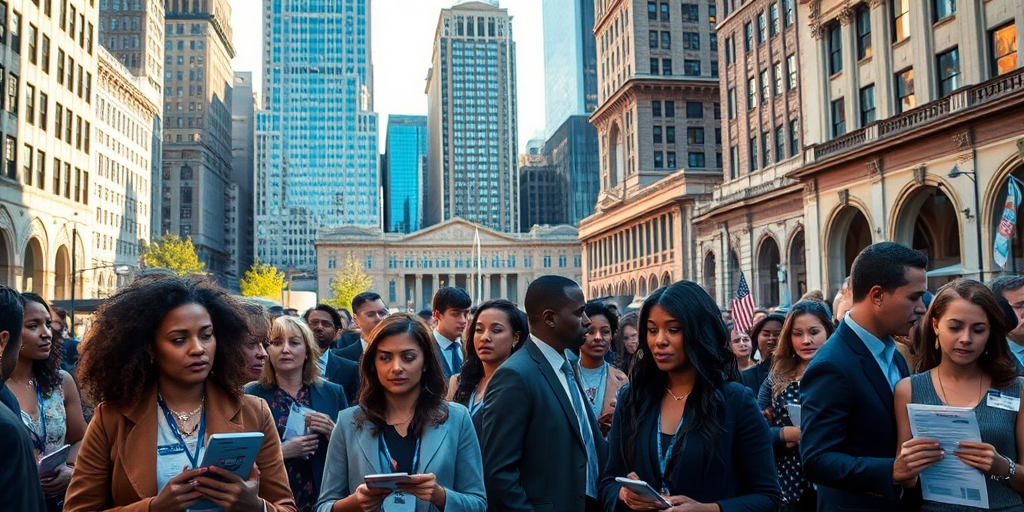Think Landing a Job Is Hard? Try Having ‘DEI’ on Your Resume
In recent years, diversity, equity, and inclusion (DEI) roles were prized components of corporate America, promising to champion a more inclusive workplace. However, for many diversity professionals, like David Daniels IV, what once was a highly sought-after career path has become a hindrance in the job market, as highlighted in Bloomberg’s detailed industry analysis.
The Rise and Fall of DEI Roles
Not too long ago, DEI professionals were essential to shaping progressive corporate cultures. Major firms, including giants like Lululemon Athletica Inc., where Daniels previously held a DEI role, actively sought to diversify their workforce, setting ambitious goals to reflect a wide array of backgrounds and perspectives.
Daniels, a New York resident and a seasoned DEI expert, recently shared his challenging experience in the job market with Bloomberg. Despite undergoing several rounds of interviews for a promising recruiting position, discussions about his DEI background during reference checks thwarted his prospects. “There’s this sense of, if you did DEI, we don’t want to hire you,” Daniels lamented.
The Backlash Against DEI Initiatives
This shift in sentiment towards DEI roles is attributed to mounting conservative criticism. High-profile figures, including former President Donald Trump, have publicly critiqued DEI policies, claiming they are exclusionary. The resulting backlash has compelled numerous companies to reevaluate their diversity commitments. Fears of potential lawsuits and losing vital government contracts have prompted businesses to shrink or dismantle their DEI departments—a stark contrast to the previously fervent embrace of such initiatives.
Local Impact: What This Means for Communities
The domino effect of reduced DEI roles extends beyond corporate doors, impacting community interest and development. Local economies, such as those in the Rio Grande Valley (RGV), where diversity-focused enterprises were starting to take root, may experience setbacks. The diminished presence of DEI professionals could hinder initiatives aimed at narrowing socioeconomic and cultural gaps within these communities.
Commissioner Sandra Lopez of Cameron County, a longtime advocate for inclusive practices, voiced her concerns. “Reducing investment in DEI doesn’t just affect employees; it affects our community dynamics. As these roles diminish, we lose crucial advocates for inclusion, impacting local businesses and our collective cultural understanding,” Lopez remarked.
Historical Context and Ongoing Issues
Historically, the RGV has faced challenges related to equality and representation, issues that DEI frameworks aimed to address. This recent shift poses the risk of undoing progress made in fostering a more inclusive society in areas already grappling with disparities.
Local activist Maria Gomez, who has worked extensively with underserved communities, emphasized the importance of maintaining momentum in DEI efforts. “We cannot afford to backtrack on inclusivity. The voices we fail to amplify and the diversity we ignore now will determine the strength of our future community fabric,” Gomez articulated.
Looking Forward: The Future of DEI Professionals
While the outlook appears daunting, it’s essential to consider long-term implications. The decline in formal DEI roles does not necessarily extinguish the importance of diversity values. DEI experts like Daniels and his peers are likely to adapt, transitioning into roles where inclusive practices remain integral, albeit in less traditional formats.
Economist Dr. Teresa Galvan from the University of Texas Rio Grande Valley underscored the indispensable role of DEI-oriented thinking in future corporate strategies. “Organizations mustn’t view DEI as a dispensable component. As global and local markets diversify, having those perspectives is not just beneficial, it’s necessary to thrive,” Dr. Galvan advised.
Participating in the Dialogue
As this narrative evolves, it’s vital for community members to stay informed and engaged. Residents can benefit from attending local forums or educational workshops focused on developing inclusive practices despite organizational cutbacks. Resources such as community-led diversity councils can provide support and continue vital conversations around equality and inclusion.
In conclusion, the reduction of DEI roles amidst conservative criticism marks a challenging chapter for diversity advocates. However, as communities come to terms with these changes, there remains an opportunity to redefine the approach to inclusive practices—ensuring they remain a cornerstone of thriving, equitable societies. In the face of adversity, South Texans, particularly those in culturally rich and diverse areas like the RGV, continue to demonstrate resilience and commitment to inclusive progress.







